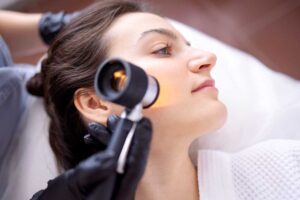We all understand that vitamin D is a game changer for bone health and calcium absorption. However, its influence extends far beyond skeletal integrity, affecting hair health and our physiological function. This leads to a frequently asked question: “Can low vitamin D cause facial hair?” To answer this, we must understand the relationship between vitamin D levels, hormonal balance, and facial hair growth. So, let’s learn today: can low vitamin D cause the growth of hair on your face?
The Multifaceted Role of Vitamin D in Hair Growth
Vitamin D is an essential vitamin that interacts with vitamin D receptors (VDRs) in various tissues, including hair follicles. These VDRs are highly important in regulating cell growth, differentiation, and the hair growth cycle. When your vitamin D status is at maximum, it supports healthy hair growth across your entire body. However, disruptions in vitamin D levels can have far-reaching consequences. They can affect not only hair health but also immune function, mood, and more.
Vitamin D Deficiency & Its Impact on Hair Follicles
A vitamin D deficiency can manifest in multiple ways, with hair loss being a symptom that is commonly recognized. While the most noticeable effect is thinning scalp hair, the influence on body hair and facial hair is more nuanced.
Some studies suggest that low vitamin D levels might also disrupt the catagen (transition), normal anagen (growth), and telogen (resting) phases of the hair follicle cycle. This disruption can cause unwanted facial hair in some people, particularly women, as it might affect the balance of androgen and estrogen receptors within the follicles.
Distinguishing Vitamin D from Other Causes
Increased facial hair or excessive hair growth is rarely solely attributable to low vitamin D. There are several other factors that contribute to facial hair, necessitating a professional evaluation:
Polycystic Ovary Syndrome (PCOS)
PCOS is a hormonal disorder and is a prevalent cause of increased facial hair in women! It is driven by increased androgen levels like testosterone. PCOS often presents with other symptoms, including acne and irregular menstrual cycles.
Genetics
Familial predisposition plays a substantial role in determining patterns of facial hair. If your family has a history of facial hair, you are more likely to experience it.
Medications
Certain medications, such as anabolic steroids or corticosteroids, can trigger hair growth on your face as a side effect.
Hormonal imbalances
Beyond PCOS, other hormonal fluctuations, like those occurring during menopause or due to adrenal gland disorders, can also cause hair growth on your face.
Idiopathic Hirsutism
Some women grow facial hair, and doctors can not find a direct cause.
Therefore, if you’re facing unwanted facial hair, you must consult a healthcare professional, either a dermatologist, aesthetic physician, or someone from the same field, for a detailed assessment to pinpoint the underlying cause.
Vitamin D Supplementation & Its Role in Hair Health
If your healthcare provider diagnoses you with vitamin D deficiency, they may recommend vitamin D supplements. While managing the deficiency can improve hair health and potentially mitigate some symptoms, it’s not a guaranteed solution for reversing or completely eliminating existing hair on your face. Your body’s response to vitamin D supplementation can vary.
It is absolutely essential to consult with a medical professional before starting any vitamin D supplementation. Too much vitamin D can cause health complications, including hypercalcemia or “high calcium levels,” which can lead to kidney stones and other issues.
Can Low Vitamin D Cause Facial Hair: A Balanced Perspective
While the question of “Can low vitamin D cause facial hair?” is valid, you should maintain a balanced perspective. Low vitamin D levels can influence hair follicles and sometimes contribute to disruptions in facial hair, but it is not the primary driver in most cases. Genetic factors, hormonal imbalances, and underlying medical conditions play more significant roles.
Strategies for Maintaining Healthy Skin & Hair
To promote healthy skin and hair growth, adopting a careful approach, which a medical professional provides, is what you need. Keep the following in mind for maintaining healthy skin and healthy hair.
- Ensure a balanced diet rich in vitamin D sources or vitamin D supplements (under medical supervision).
- Get adequate vitamin D levels through safe sun exposure.
- Always consume a nutritious diet abundant in essential vitamins and minerals, including biotin, zinc, and iron, which are a must-have for the health of your hair.
- Manage stress levels through relaxation techniques. Stress can exacerbate hormonal imbalances and affect the growth of hair on your face.
- Visit a professional for guidance from a dermatologist or healthcare provider for any concerns about hair loss or facial hair.
- If you have concerns about beard growth or any other type of hair growth, consult a medical professional.
- In the end, always regularly check your vitamin D status with a blood test.
Final Thoughts
In summary, while low vitamin D can cause facial hair, this prompts a valid inquiry. However, you must consider the broader context of hormonal equilibrium. Addressing low vitamin D and maintaining a healthy lifestyle are the keys to hair health, but professional medical advice is indispensable for accurately diagnosing and managing facial hair concerns.
Struggling with Facial Hair? Skin Artistry Clinic Has the Perfect Solution!
Struggling with unwanted facial hair growth and feeling self-conscious about it? Call the Skin Artistry Clinic today. We offer professional hair removal procedures and treatments that can help resolve your issue. Our services include laser hair therapy, longevity medicines, and several other solutions to address this concern.
We are also experts in IPL skin rejuvenation (photofacial), Kybella, medical-grade skin peels, medical-grade skincare lines, fillers, RF microneedling, Hydrafacial, and IV therapy. We serve Alamo, Danville, Walnut Creek, San Ramon, Lafayette, Moraga, Orinda, Piedmont, and beyond. Call our aesthetic physicians today to schedule your appointment.



